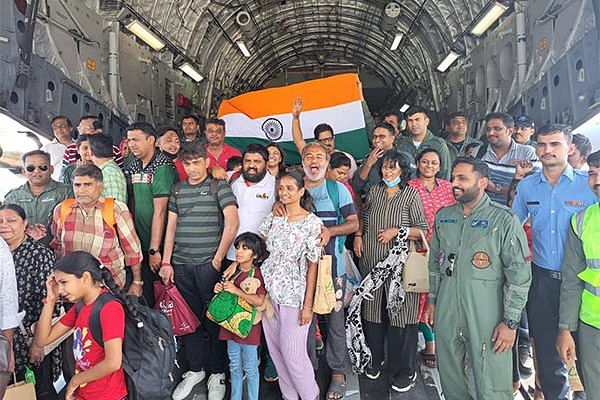As the warring factions in Sudan agreed to a 72-hour ceasefire following a US-Saudi Arabia mediated truce, several countries swiftly evacuated their nationals from the strife-torn areas. Under ‘Operation Kaveri’, India evacuated about 360 Indians stranded in the war zone. After the evacuation from Ukraine, this is the second major operation by New Delhi to “bring back its own”, as External Affairs Minister S Jaishankar had tweeted.
With the US and Russia accusing each other of hurting their strategic interests in Africa, the Sudan crisis has become a part of the neo-Cold War, specifically the Russia-Ukraine conflict. The apprehension that the Sudan civil war could spread to other parts of East and Central Africa cannot be dismissed as far-fetched.
India has trade relations with many countries in this region and other African countries such as Nigeria, Angola, Algeria, Egypt, Equatorial Guinea, Cameroon, Chad, Ghana, and Côte d’Ivoire. These African nations account for about 15 percent or 34 million tonnes of India’s total oil imports. Stability in Sudan is necessary for entering into commercial partnership with these countries.
India will have to activate Asia-Africa Growth Corridor (AAGC) projects and also engage in building a diplomatic partnership between like-minded countries to resolve the Sudan conflict and insulate other African nations from being drawn into the neo-Cold War. Getting our citizens back was important but protecting our interests and assets in these countries are equally significant in the changing geopolitical situation.
Also read: Sudan’s capital echoes with gunfire as foreign powers seek truce extension
Failure of UN forces
The crisis in Sudan escalated when armed clashes erupted in capital Khartoum between the Sudanese Armed Force (SAF) commanded by General Abdel Fattah al-Burhan and the rival Rapid Support Forces (RSF) led by General Mohamed Hamdan Dagalo. More than 200 people were reportedly killed and thousands injured. Clashes also took place in oil-rich Darfur, which has been a hotbed of conflicts and a bone of contention between the warring groups. Employees of the World Food Programme (WFP) have been killed, forcing the UN organisation to suspend all activities.
Although the United Nations and other aid agencies have significant involvement, experience, and ground support in the conflict-affected areas, most of their staff are from western countries who have come under the crossfire. In such a situation, African organisations like the Intergovernmental Authority on Development (IGAD) have stepped into the shoes of the UN.
The eight-member IGAD, an East African trade organisation established in 1996 which concerns itself with peace and conflict resolution, besides trade and commerce, has asked the presidents of Kenya, South Sudan, and Djibouti to visit Khartoum in a bid to end the civil war.
Also read: If Quad doesn’t start biting soon, India must look at newer partners that would
A violent history
Sudan has a long and chequered history of civil strife culminating in ‘one country –two governments’ to Partition. Even after the referendum and Partition, sporadic clashes between the tribes and between North and South Sudan did not cease, turning both regions into a fertile arena for stronger powers to intervene and effect change of regimes.
One of the reasons for the repeated brutal internecine armed conflicts is the lust for power, which gives immense opportunities to indulge in corruption and liquidate rivals, mostly from different tribes. The traditional tribal animosity is an important reason for the formation of various groups, besides religious divide. It was one such situation that led to the 2019 uprising, which ousted dictatorial ruler Omar al-Bashir, who had built up formidable security forces that he is now believed to have deliberately set against each other.
Omar was also accused of being directly responsible for ‘crimes against humanity’ in Darfur. The International Criminal Court in The Hague wanted the Sudanese authorities to hand Bashir over, which Khartoum refused. Bashir was also accused of receiving $90m in cash from Saudi Arabia, which he admitted in court. The transfer of power from the temporary council, which included army and civilians, never took place.
Also read: BRICS with a Capital C: How Covid robbed members of economic advantage
Another case of foreign meddling?
As part of its Africa outreach strategy, Russian Foreign Minister Sergei Lavrov visited Mali, Iraq, Mauritania, and Sudan in February, ostensibly claiming to increase economic and diplomatic coordination as well as infrastructure investment in these countries and Sudan in particular. In Sudan, during a press conference, Lavrov is reported to have said, “We discussed the need to coordinate within international institutions, reform the (U.N.) Security Council, and build a multipolar world.” Meanwhile, Khartoum was also hosting envoys from the United States, Britain, France and other countries who were supposed to be attempting to form a new democratic civilian government in Sudan.
The clash of interest between the US-led West and Russia was evident on two counts. One was the interest of Moscow – hit by sanctions – to tap into resources in oil-rich Darfur and other areas in Sudan, and trade in oil for weapons. The second, and more importantly, was the US’s worries over the agreement between Sudan and Russia allowing Moscow to set up a naval base with 300 Russian troops and four navy ships, including nuclear-powered ones, in the strategic Port of Sudan. This agreement, which was finalised during Lavrov’s visit to Khartoum, was under discussion since 2019 but had to be scuttled due to the 2021 coup. The current deal needs Sudan’s ‘civilian’ Parliament to ratify it. But an escalating civil war means the Russian strategy to build a port in Sudan would be a non-starter.
Seshadri Chari is the former editor of ‘Organiser’. He tweets @seshadrichari. Views are personal.
(Edited by Prashant)



